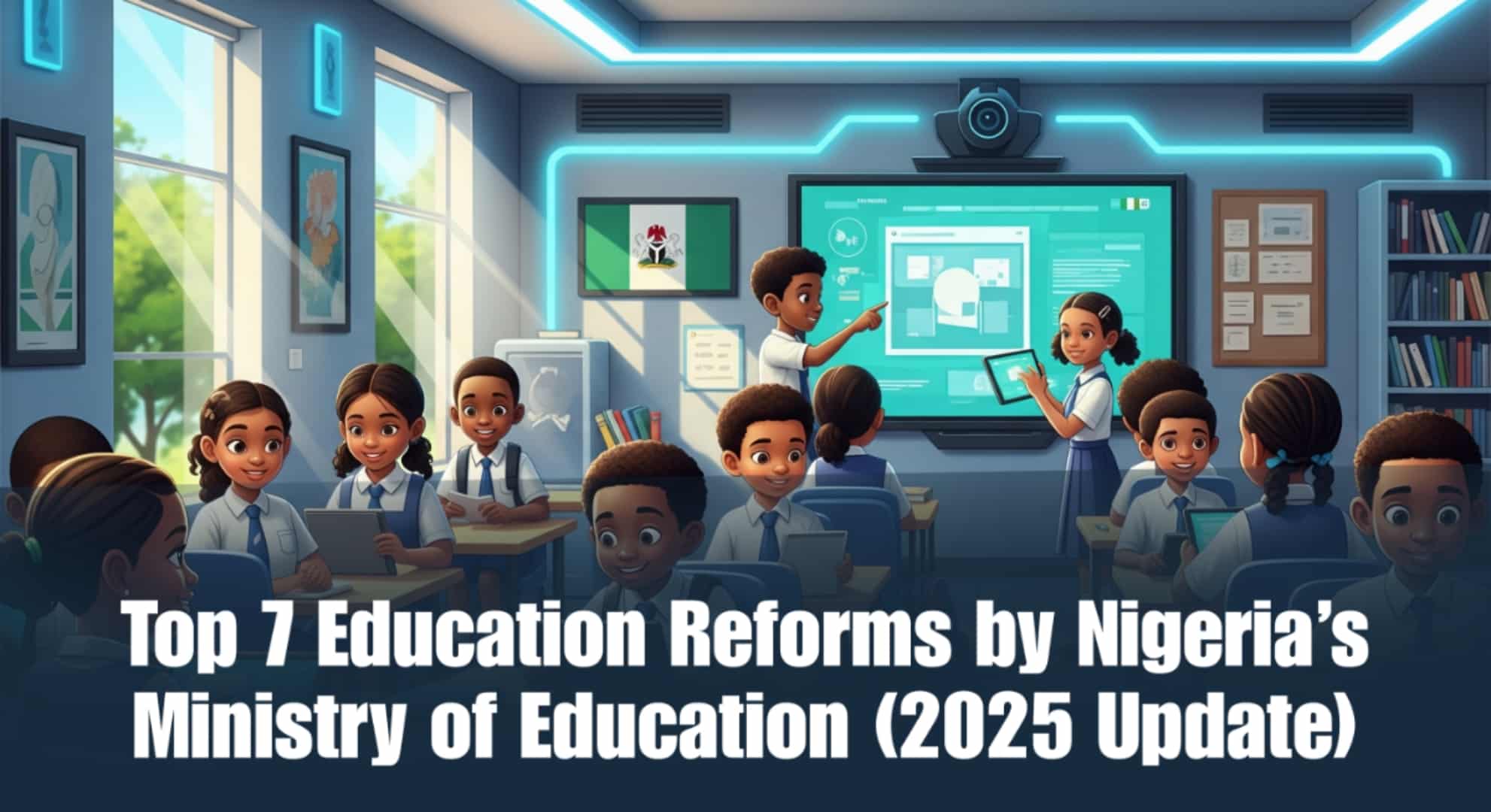Education is the backbone of national development, and Nigeria’s Ministry of Education has taken bold steps in 2025 to reshape the sector for a brighter future. From digital transformation to curriculum modernization, these reforms aim to address long-standing issues while preparing Nigerian students for a competitive global environment.
Below, we break down the Top 7 key reforms introduced by the Ministry in 2025, their impact, and why they matter.
1. Nationwide Smart Classroom Initiative
Overview
In 2025, the Ministry launched the Smart Classroom Project, targeting primary and secondary schools across all 36 states and the FCT.
What It Includes
- Interactive digital boards
- High-speed internet access
- Tablets for students and teachers
- Pre-installed educational software
Impact
The aim is to bridge the urban-rural education divide and promote digital literacy from early stages.
2. Overhaul of the National Curriculum
Overview
The outdated 6-3-3-4 system has been refined to integrate entrepreneurship, digital skills, and climate education.
Key Changes
- Coding and robotics from JSS level
- Life skills and financial literacy
- Agricultural technology and climate resilience
Why It Matters
This curriculum realignment prepares students not just for exams, but for life, work, and innovation.
3. Teacher Training & Re-certification Programme
Overview
All public school teachers now undergo mandatory yearly training and digital certification.
Focus Areas
- Pedagogy in the digital age
- Inclusive and adaptive learning
- Psychological support and student management
Expected Outcome
A more empowered, professional teaching workforce with improved classroom delivery.
4. Education Data Management System (EDMS)
Overview
A centralized digital portal now tracks real-time school data nationwide — from attendance to performance.
Core Features
- Student tracking
- Performance dashboards
- Data for policy-making and intervention
Significance
EDMS enables data-driven decisions and greater transparency in the education system.
5. Increased Budget Allocation & Monitoring
Overview
The Federal Government increased the education sector’s budget to 15% of the national budget, meeting UNESCO’s recommended standard.
Monitoring Structure
- State-level transparency audits
- Disbursement tied to performance
- Collaboration with civil society groups
Why It Matters
Improved funding ensures better infrastructure, teacher pay, and resource availability.
6. National School Feeding Program Expansion
Overview
The school feeding programme was extended to all government-owned primary schools, including hard-to-reach communities.
Objectives
- Improve nutrition and learning
- Boost school attendance
- Support local agriculture
Current Impact
Already, over 11 million children benefit daily — reducing absenteeism and boosting early childhood retention.
7. Inclusive & Special Needs Education Policy
Overview
A comprehensive reform to mainstream special education and support inclusive classrooms.
New Measures
- Grants for special education schools
- Mandatory inclusion policy for public schools
- Training teachers in sign language and Braille
Outcome
Nigeria moves toward educational equity, giving every child a fair chance regardless of ability.
Conclusion: Building a Future-Ready Nigeria
The 2025 education reforms mark a pivotal moment in Nigeria’s history. By embracing technology, inclusivity, and sustainability, the Ministry of Education is laying the foundation for a smarter, stronger, and more skilled generation.
Stay Connected to Education Trends
If you’re passionate about Nigeria’s education future or you’re a student, parent, or educator — you’ll want to stay tuned.
📢 Follow us on ScholarCareer.com.ng for real-time updates, expert insights, scholarship info, and policy breakdowns.
👍 Don’t forget to comment, like, and share this article with fellow Nigerians and let’s build an educated nation together.

